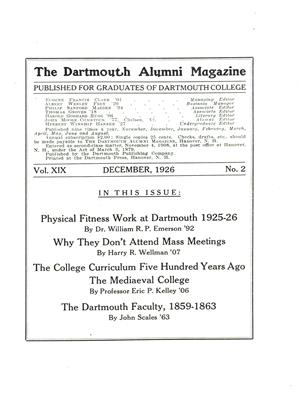Following campus discussion as to the relative merits of "Men of Dartmouth" and "The Dartmouth Song" the following communication from President Hopkins was published in THE DARTMOUTH :
To the Editor of THE DARTMOUTH:
May I have the privilege of your columns to say a word in regard to the discussion concerning what song should be sung as the representative song of the College.
I have been asked again and again to make an official ruling on what should be "the Dartmouth song," and I have always declined because "the Dartmouth song" ought to be and almost inevitably will be the song which Dartmouth men wish to sing.
One of my predecessors in the Wheelock succession made an official ruling to the effect that "Men of Dartmouth" should replace the so-called "Dartmouth Song." As is the way frequently with official ukases in college circles, this ruffled the feelings of the undergraduates and antagonized many an alumnus. For a number of years succeeding, the old Alma Mater song was sung with new fervor and deeper devotion in recognition of the fact that thereby loyalty was not only being pledged to the College, but independence was being expressed of administrative opinion. The words and the music came for a time to be almost a new Marseillaise.
It has been said that the secret of good administration is to decide quickly, and sometimes right. On this particular matter, however, I have been so solicitous not to aid and abet any lurking sentiment that might be existent somewhere in behalf of the old song that I have tried to school myself to a complete neutrality of feeling. The contention at the present time, however, has so definitely appealed to my desire to see a change that with all the risks of doing so, I am impelled to state my position.
Personally, I can see no argument for the use of the old Alma Mater song as compared with "Men of Dartmouth" for any occasion which demands an expression of worthy College feeling. My antipathy to the older song began nearly 30 years ago with my first enrollment in the College, and has consistently held ever since, with only this difference, that for the last two decades we have had an alternative in "Men of Dartmouth," set to appropriate music, which we did not have before.
I have sometimes reflected in more recent years that perhaps the older song had a use In that it made defeat in athletic competitions more terrible than it would otherwise have had to be in anticipation of the necessity of singing the older song.
However, now at last the influence of this particular urge toward victory seems to have disappeared.
I would not be too flippant in regard to the matter, however, for it has its serious aspects. A prominent musical critic, judge in one of the intercollegiate glee club concerts in New York a few years ago, told me that in the competition of the previous winter the judges were unanimous for making the award of first distinction to Dartmouth until the singing of the Alma Mater song. His words to me were, "No human beings could sing that song well enough to be entitled to an award of merit."
I am not as enthusiastic as many of the undergraduates of the present day for the overthrowing of all tradition and the eliminating of all color and dramatic fire and pungent atmosphere from College life. When, however, the undergraduates of the present College turn on the administration a half decade or so hence, and urge the restoration of many of those things for whose elimination they have been largely responsible, it would be a source of immense satisfaction to me if amidst the much harmful violence which had been done to tradition, it should be found that so worthy a purpose had been achieved as the obliteration of a song wholly inadequate to and unworthy of the College in whose behalf it had been presumably sung from time to time.
 View Full Issue
View Full Issue
More From This Issue
-
 Lettter from the Editor
Lettter from the EditorEditorial Comment
December 1926 -
 Article
ArticleALUMNI ASSOCIATIONS
December 1926 -
 Article
ArticleTHE COLLEGE CURRICULUM FIVE HUNDRED YEARS AGO THE MEDIEVAL COLLEGE
December 1926 By Professor Eric P. Kelly '06 -
 Article
ArticlePHYSICAL FITNESS WORK AT DARTMOUTH 1925-26
December 1926 By William R. P. Emerson, M. D. -
 Article
ArticleC. F. RICHARDSON'S TRIBUTE TO THE GREAT PRESIDENT
December 1926 -
 Article
ArticleWHY THEY DON'T ATTEND MASS MEETINGS
December 1926 By Harry R. Wellman '07










